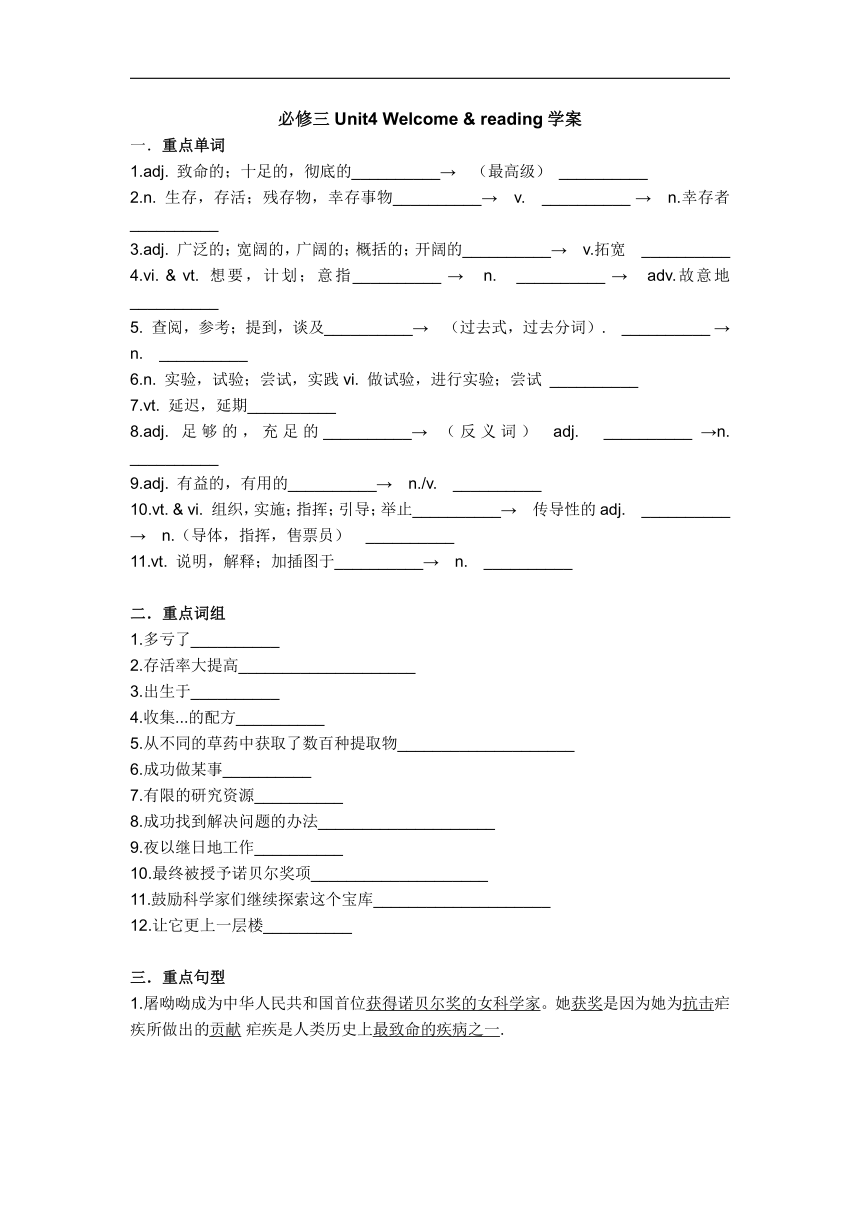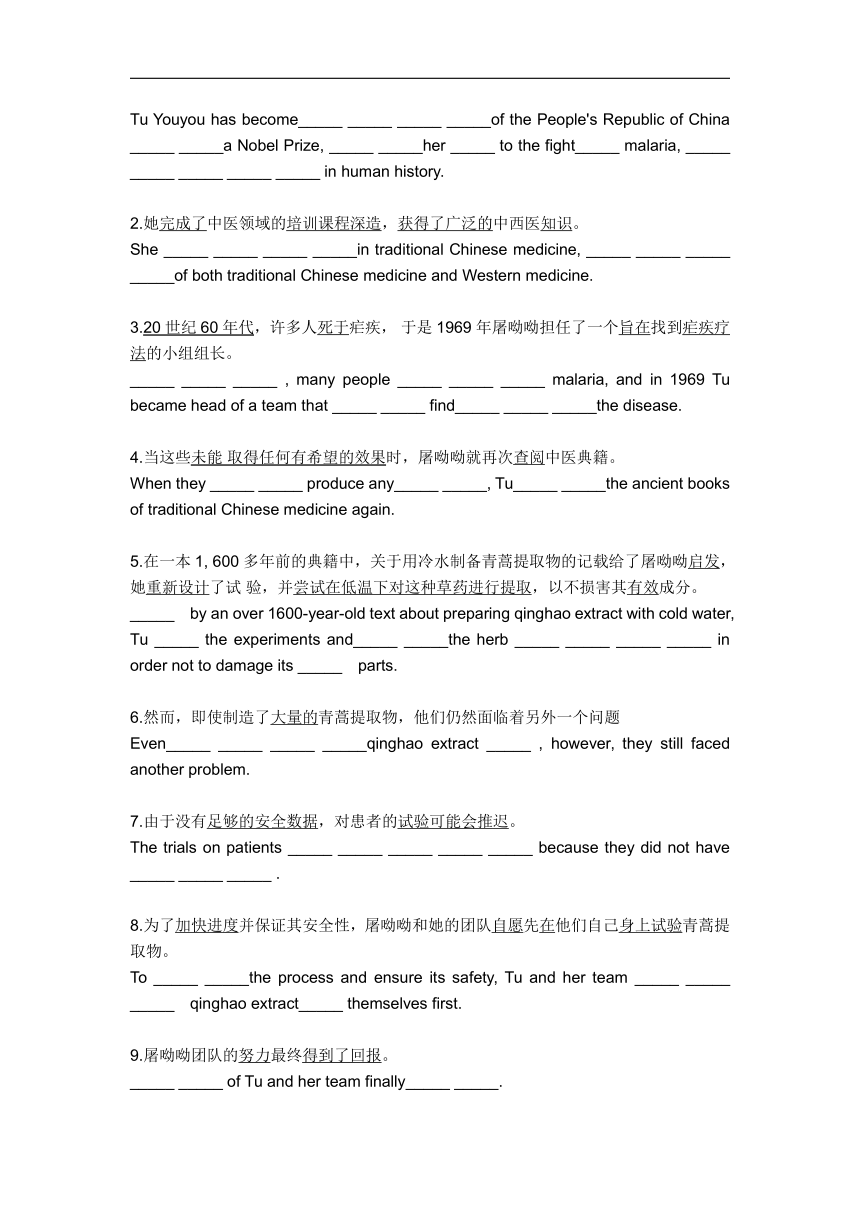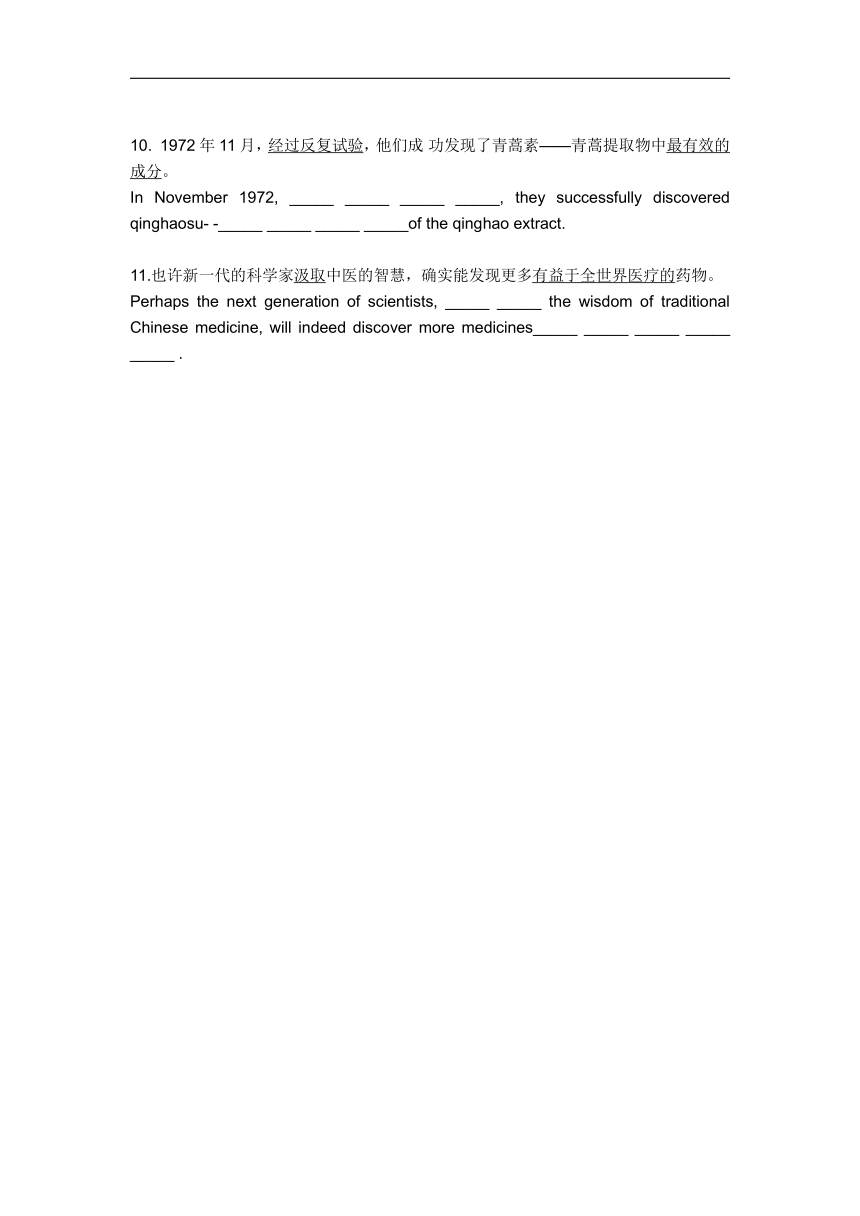牛津译林版(2019)必修 第三册Unit 4 Scientists Who Changed the World Welcome to the unit & Reading导学案(含答案)
文档属性
| 名称 | 牛津译林版(2019)必修 第三册Unit 4 Scientists Who Changed the World Welcome to the unit & Reading导学案(含答案) |  | |
| 格式 | docx | ||
| 文件大小 | 25.4KB | ||
| 资源类型 | 教案 | ||
| 版本资源 | 牛津译林版(2019) | ||
| 科目 | 英语 | ||
| 更新时间 | 2024-04-04 19:27:26 | ||
图片预览



文档简介
必修三Unit4 Welcome & reading学案
重点单词
1.adj. 致命的;十足的,彻底的__________→ (最高级) __________
2.n. 生存,存活;残存物,幸存事物__________→ v. __________ → n.幸存者 __________
3.adj. 广泛的;宽阔的,广阔的;概括的;开阔的__________→ v.拓宽 __________
4.vi. & vt. 想要,计划;意指__________ → n. __________ → adv.故意地 __________
5. 查阅,参考;提到,谈及__________→ (过去式,过去分词). __________ → n. __________
6.n. 实验,试验;尝试,实践vi. 做试验,进行实验;尝试 __________
7.vt. 延迟,延期__________
8.adj. 足够的,充足的__________→ (反义词) adj. __________ →n. __________
9.adj. 有益的,有用的__________→ n./v. __________
10.vt. & vi. 组织,实施;指挥;引导;举止__________→ 传导性的adj. __________ → n.(导体,指挥,售票员) __________
11.vt. 说明,解释;加插图于__________→ n. __________
二.重点词组
1.多亏了__________
2.存活率大提高____________________
3.出生于__________
4.收集...的配方__________
5.从不同的草药中获取了数百种提取物____________________
6.成功做某事__________
7.有限的研究资源__________
8.成功找到解决问题的办法____________________
9.夜以继日地工作__________
10.最终被授予诺贝尔奖项____________________
11.鼓励科学家们继续探索这个宝库____________________
12.让它更上一层楼__________
三.重点句型
1.屠呦呦成为中华人民共和国首位获得诺贝尔奖的女科学家。她获奖是因为她为抗击疟疾所做出的贡献 疟疾是人类历史上最致命的疾病之一.
Tu Youyou has become_____ _____ _____ _____of the People's Republic of China _____ _____a Nobel Prize, _____ _____her _____ to the fight_____ malaria, _____ _____ _____ _____ _____ in human history.
2.她完成了中医领域的培训课程深造,获得了广泛的中西医知识。
She _____ _____ _____ _____in traditional Chinese medicine, _____ _____ _____ _____of both traditional Chinese medicine and Western medicine.
3.20世纪60年代,许多人死于疟疾, 于是1969年屠呦呦担任了一个旨在找到疟疾疗法的小组组长。
_____ _____ _____ , many people _____ _____ _____ malaria, and in 1969 Tu became head of a team that _____ _____ find_____ _____ _____the disease.
4.当这些未能 取得任何有希望的效果时,屠呦呦就再次查阅中医典籍。
When they _____ _____ produce any_____ _____, Tu_____ _____the ancient books of traditional Chinese medicine again.
5.在一本1, 600多年前的典籍中,关于用冷水制备青蒿提取物的记载给了屠呦呦启发,她重新设计了试 验,并尝试在低温下对这种草药进行提取,以不损害其有效成分。
_____ by an over 1600-year-old text about preparing qinghao extract with cold water, Tu _____ the experiments and_____ _____the herb _____ _____ _____ _____ in order not to damage its _____ parts.
6.然而,即使制造了大量的青蒿提取物,他们仍然面临着另外一个问题
Even_____ _____ _____ _____qinghao extract _____ , however, they still faced another problem.
7.由于没有足够的安全数据,对患者的试验可能会推迟。
The trials on patients _____ _____ _____ _____ _____ because they did not have _____ _____ _____ .
8.为了加快进度并保证其安全性,屠呦呦和她的团队自愿先在他们自己身上试验青蒿提取物。
To _____ _____the process and ensure its safety, Tu and her team _____ _____ _____ qinghao extract_____ themselves first.
9.屠呦呦团队的努力最终得到了回报。
_____ _____ of Tu and her team finally_____ _____.
1972年11月,经过反复试验,他们成 功发现了青蒿素——青蒿提取物中最有效的成分。
In November 1972, _____ _____ _____ _____, they successfully discovered qinghaosu- -_____ _____ _____ _____of the qinghao extract.
11.也许新一代的科学家汲取中医的智慧,确实能发现更多有益于全世界医疗的药物。
Perhaps the next generation of scientists, _____ _____ the wisdom of traditional Chinese medicine, will indeed discover more medicines_____ _____ _____ _____ _____ .
教师版答案:
一.重点单词
1.adj. 致命的;十足的,彻底的deadly→ (最高级)deadliest
2.n. 生存,存活;残存物,幸存事物survival→ v. survive → n.幸存者 survivor
3.adj. 广泛的;宽阔的,广阔的;概括的;开阔的broad→ v.拓宽 broaden
4.vi. & vt. 想要,计划;意指intend → n. intention → adv.故意地 intentionally
5. 查阅,参考;提到,谈及refer→ (过去式,过去分词). referred / referred → n. reference
6.n. 实验,试验;尝试,实践vi. 做试验,进行实验;尝试 experiment
7.vt. 延迟,延期postpone
8.adj. 足够的,充足的sufficient→ (反义词) adj. insufficient →n. sufficiency
9.adj. 有益的,有用的beneficial→ n./v. benefit
10.vt. & vi. 组织,实施;指挥;引导;举止conduct→ 传导性的adj. conductive → n.(导体,指挥,售票员) conductor
11.vt. 说明,解释;加插图于illustrate→ n. illustration
二.重点词组
1.多亏了thanks to
2.存活率大提高have a greatly increased chance of survival
3.出生于be born in
4.收集...的配方collect recipes for...
5.从不同的草药中获取了数百种提取物make hundreds of extracts from different herbs
6.成功做某事succeeded in doing sth.
7.有限的研究资源limited research resources
8.成功找到解决问题的办法managed to find solutions to the problem
9.夜以继日地工作work day and night
10.最终被授予诺贝尔奖项be eventually awarded a Nobel Prize
11.鼓励科学家们继续探索这个宝库encouraged scientists to further explore the treasure house
12.让它更上一层楼raise it to a higher level
三.重点句型
1.屠呦呦成为中华人民共和国首位获得诺贝尔奖的女科学家。她获奖是因为她为抗击疟疾所做出的贡献 疟疾是人类历史上最致命的疾病之一.
Tu Youyou has become the first female scientist of the People's Republic of China to receive a Nobel Prize, awarded for her contribution to the fight against malaria, one of the deadliest diseases in human history.
2.她完成了中医领域的培训课程深造,获得了广泛的中西医知识。
She completed further training courses in traditional Chinese medicine, acquiring a broad knowledge of both traditional Chinese medicine and Western medicine.
3.20世纪60年代,许多人死于疟疾, 于是1969年屠呦呦担任了一个旨在找到疟疾疗法的小组组长。
In the 1960s, many people were dying of malaria, and in 1969 Tu became head of a team that intended to find a cure for the disease.
4.当这些未能 取得任何有希望的效果时,屠呦呦就再次查阅中医典籍。
When they failed to produce any promising results, Tu referred to the ancient books of traditional Chinese medicine again.
5.在一本1, 600多年前的典籍中,关于用冷水制备青蒿提取物的记载给了屠呦呦启发,她重新设计了试 验,并尝试在低温下对这种草药进行提取,以不损害其有效成分。
Inspired by an over 1600-year-old text about preparing qinghao extract with cold water, Tu redesigned the experiments and tried extracting the herb at a low temperature in order not to damage its effective parts.
6.然而,即使制造了大量的青蒿提取物,他们仍然面临着另外一个问题
Even with large amounts of qinghao extract produced, however, they still faced another problem.
7.由于没有足够的安全数据,对患者的试验可能会推迟。
The trials on patients were likely to be postponed because they did not have sufficient safety data.
8.为了加快进度并保证其安全性,屠呦呦和她的团队自愿先在他们自己身上试验青蒿提取物。
To speed up the process and ensure its safety, Tu and her team volunteered to test qinghao extract on themselves first.
9.屠呦呦团队的努力最终得到了回报。
The efforts of Tu and her team finally paid off.
10.1972年11月,经过反复试验,他们成 功发现了青蒿素——青蒿提取物中最有效的成分。
In November 1972, through trial and error, they successfully discovered qinghaosu- -the most effective part of the qinghao extract.
11.也许新一代的科学家汲取中医的智慧,确实能发现更多有益于全世界医疗的药物。
Perhaps the next generation of scientists, drawing on the wisdom of traditional Chinese medicine, will indeed discover more medicines beneficial to global health care.
重点单词
1.adj. 致命的;十足的,彻底的__________→ (最高级) __________
2.n. 生存,存活;残存物,幸存事物__________→ v. __________ → n.幸存者 __________
3.adj. 广泛的;宽阔的,广阔的;概括的;开阔的__________→ v.拓宽 __________
4.vi. & vt. 想要,计划;意指__________ → n. __________ → adv.故意地 __________
5. 查阅,参考;提到,谈及__________→ (过去式,过去分词). __________ → n. __________
6.n. 实验,试验;尝试,实践vi. 做试验,进行实验;尝试 __________
7.vt. 延迟,延期__________
8.adj. 足够的,充足的__________→ (反义词) adj. __________ →n. __________
9.adj. 有益的,有用的__________→ n./v. __________
10.vt. & vi. 组织,实施;指挥;引导;举止__________→ 传导性的adj. __________ → n.(导体,指挥,售票员) __________
11.vt. 说明,解释;加插图于__________→ n. __________
二.重点词组
1.多亏了__________
2.存活率大提高____________________
3.出生于__________
4.收集...的配方__________
5.从不同的草药中获取了数百种提取物____________________
6.成功做某事__________
7.有限的研究资源__________
8.成功找到解决问题的办法____________________
9.夜以继日地工作__________
10.最终被授予诺贝尔奖项____________________
11.鼓励科学家们继续探索这个宝库____________________
12.让它更上一层楼__________
三.重点句型
1.屠呦呦成为中华人民共和国首位获得诺贝尔奖的女科学家。她获奖是因为她为抗击疟疾所做出的贡献 疟疾是人类历史上最致命的疾病之一.
Tu Youyou has become_____ _____ _____ _____of the People's Republic of China _____ _____a Nobel Prize, _____ _____her _____ to the fight_____ malaria, _____ _____ _____ _____ _____ in human history.
2.她完成了中医领域的培训课程深造,获得了广泛的中西医知识。
She _____ _____ _____ _____in traditional Chinese medicine, _____ _____ _____ _____of both traditional Chinese medicine and Western medicine.
3.20世纪60年代,许多人死于疟疾, 于是1969年屠呦呦担任了一个旨在找到疟疾疗法的小组组长。
_____ _____ _____ , many people _____ _____ _____ malaria, and in 1969 Tu became head of a team that _____ _____ find_____ _____ _____the disease.
4.当这些未能 取得任何有希望的效果时,屠呦呦就再次查阅中医典籍。
When they _____ _____ produce any_____ _____, Tu_____ _____the ancient books of traditional Chinese medicine again.
5.在一本1, 600多年前的典籍中,关于用冷水制备青蒿提取物的记载给了屠呦呦启发,她重新设计了试 验,并尝试在低温下对这种草药进行提取,以不损害其有效成分。
_____ by an over 1600-year-old text about preparing qinghao extract with cold water, Tu _____ the experiments and_____ _____the herb _____ _____ _____ _____ in order not to damage its _____ parts.
6.然而,即使制造了大量的青蒿提取物,他们仍然面临着另外一个问题
Even_____ _____ _____ _____qinghao extract _____ , however, they still faced another problem.
7.由于没有足够的安全数据,对患者的试验可能会推迟。
The trials on patients _____ _____ _____ _____ _____ because they did not have _____ _____ _____ .
8.为了加快进度并保证其安全性,屠呦呦和她的团队自愿先在他们自己身上试验青蒿提取物。
To _____ _____the process and ensure its safety, Tu and her team _____ _____ _____ qinghao extract_____ themselves first.
9.屠呦呦团队的努力最终得到了回报。
_____ _____ of Tu and her team finally_____ _____.
1972年11月,经过反复试验,他们成 功发现了青蒿素——青蒿提取物中最有效的成分。
In November 1972, _____ _____ _____ _____, they successfully discovered qinghaosu- -_____ _____ _____ _____of the qinghao extract.
11.也许新一代的科学家汲取中医的智慧,确实能发现更多有益于全世界医疗的药物。
Perhaps the next generation of scientists, _____ _____ the wisdom of traditional Chinese medicine, will indeed discover more medicines_____ _____ _____ _____ _____ .
教师版答案:
一.重点单词
1.adj. 致命的;十足的,彻底的deadly→ (最高级)deadliest
2.n. 生存,存活;残存物,幸存事物survival→ v. survive → n.幸存者 survivor
3.adj. 广泛的;宽阔的,广阔的;概括的;开阔的broad→ v.拓宽 broaden
4.vi. & vt. 想要,计划;意指intend → n. intention → adv.故意地 intentionally
5. 查阅,参考;提到,谈及refer→ (过去式,过去分词). referred / referred → n. reference
6.n. 实验,试验;尝试,实践vi. 做试验,进行实验;尝试 experiment
7.vt. 延迟,延期postpone
8.adj. 足够的,充足的sufficient→ (反义词) adj. insufficient →n. sufficiency
9.adj. 有益的,有用的beneficial→ n./v. benefit
10.vt. & vi. 组织,实施;指挥;引导;举止conduct→ 传导性的adj. conductive → n.(导体,指挥,售票员) conductor
11.vt. 说明,解释;加插图于illustrate→ n. illustration
二.重点词组
1.多亏了thanks to
2.存活率大提高have a greatly increased chance of survival
3.出生于be born in
4.收集...的配方collect recipes for...
5.从不同的草药中获取了数百种提取物make hundreds of extracts from different herbs
6.成功做某事succeeded in doing sth.
7.有限的研究资源limited research resources
8.成功找到解决问题的办法managed to find solutions to the problem
9.夜以继日地工作work day and night
10.最终被授予诺贝尔奖项be eventually awarded a Nobel Prize
11.鼓励科学家们继续探索这个宝库encouraged scientists to further explore the treasure house
12.让它更上一层楼raise it to a higher level
三.重点句型
1.屠呦呦成为中华人民共和国首位获得诺贝尔奖的女科学家。她获奖是因为她为抗击疟疾所做出的贡献 疟疾是人类历史上最致命的疾病之一.
Tu Youyou has become the first female scientist of the People's Republic of China to receive a Nobel Prize, awarded for her contribution to the fight against malaria, one of the deadliest diseases in human history.
2.她完成了中医领域的培训课程深造,获得了广泛的中西医知识。
She completed further training courses in traditional Chinese medicine, acquiring a broad knowledge of both traditional Chinese medicine and Western medicine.
3.20世纪60年代,许多人死于疟疾, 于是1969年屠呦呦担任了一个旨在找到疟疾疗法的小组组长。
In the 1960s, many people were dying of malaria, and in 1969 Tu became head of a team that intended to find a cure for the disease.
4.当这些未能 取得任何有希望的效果时,屠呦呦就再次查阅中医典籍。
When they failed to produce any promising results, Tu referred to the ancient books of traditional Chinese medicine again.
5.在一本1, 600多年前的典籍中,关于用冷水制备青蒿提取物的记载给了屠呦呦启发,她重新设计了试 验,并尝试在低温下对这种草药进行提取,以不损害其有效成分。
Inspired by an over 1600-year-old text about preparing qinghao extract with cold water, Tu redesigned the experiments and tried extracting the herb at a low temperature in order not to damage its effective parts.
6.然而,即使制造了大量的青蒿提取物,他们仍然面临着另外一个问题
Even with large amounts of qinghao extract produced, however, they still faced another problem.
7.由于没有足够的安全数据,对患者的试验可能会推迟。
The trials on patients were likely to be postponed because they did not have sufficient safety data.
8.为了加快进度并保证其安全性,屠呦呦和她的团队自愿先在他们自己身上试验青蒿提取物。
To speed up the process and ensure its safety, Tu and her team volunteered to test qinghao extract on themselves first.
9.屠呦呦团队的努力最终得到了回报。
The efforts of Tu and her team finally paid off.
10.1972年11月,经过反复试验,他们成 功发现了青蒿素——青蒿提取物中最有效的成分。
In November 1972, through trial and error, they successfully discovered qinghaosu- -the most effective part of the qinghao extract.
11.也许新一代的科学家汲取中医的智慧,确实能发现更多有益于全世界医疗的药物。
Perhaps the next generation of scientists, drawing on the wisdom of traditional Chinese medicine, will indeed discover more medicines beneficial to global health care.
同课章节目录
- Unit 1 Nature in the balance
- Welcome to the unit
- Reading
- Grammar and usage
- Integrated skills
- Extended reading
- Project
- Unit 2 Natural disasters
- Welcome to the unit
- Reading
- Grammar and usage
- Integrated skills
- Extended reading
- Project
- Unit 3 The world online
- Welcome to the unit
- Reading
- Grammar and usage
- Integrated skills
- Extended reading
- Project
- Unit 4 Scientists who changed the world
- Welcome to the unit
- Reading
- Grammar and usage
- Integrated skills
- Extended reading
- Project
